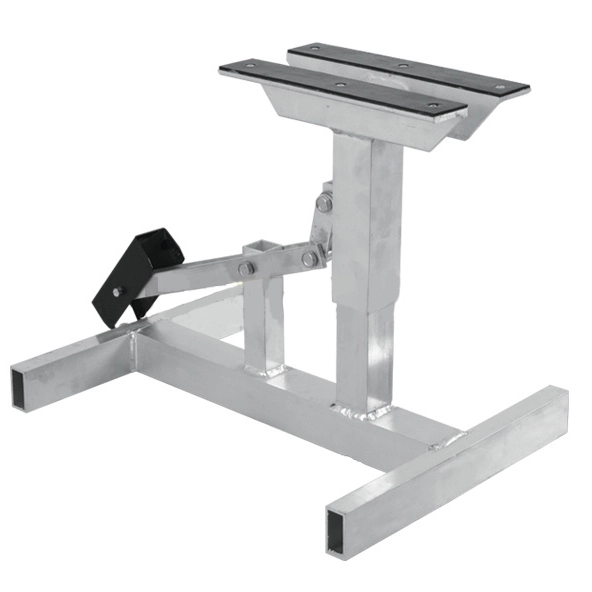The Evolution of Motorcycle Lift Stand Design
From Basic Jacks to Advanced Hydraulic Systems
The evolution of motorcycle lift stands began with basic mechanical jacks that required manual effort to lift motorcycles, often demanding considerable strength and precision. These early systems, while functional, were limited in terms of ease and efficiency. As technology progressed, hydraulic lift systems were introduced, providing a smoother lifting action and greater control. Hydraulic systems allowed riders and mechanics to lift motorcycles with minimal effort, significantly reducing physical strain. These advancements made it easier to handle heavier bikes, enhancing safety and streamlining maintenance tasks in both professional and DIY settings.
Integrating Ergonomic Principles
As motorcycle stand lifts evolved, manufacturers began focusing more on user comfort and safety. Modern lift stands now feature ergonomic enhancements such as adjustable height settings, which allow for a customized lifting range to suit different tasks and user preferences. Padded platforms are also standard, providing a more secure and comfortable support surface for the bike. Additionally, controls are strategically placed to allow for easy and safe operation while minimizing the risk of strain. These ergonomic improvements not only promote a healthier work environment but also increase productivity during lengthy repair or maintenance sessions.
Customization for Various Motorcycle Types
With the diversity of motorcycles on the market, lift stand manufacturers recognized the need for more specialized solutions. Today, there are lift stands specifically designed to accommodate the varying shapes, weights, and designs of different motorcycle types, from lightweight sport bikes to heavy cruisers. These tailored solutions ensure that every bike, regardless of size or design, can be safely lifted and securely supported during maintenance or repairs. This level of customization boosts the versatility of workshops, allowing mechanics to work with greater confidence and efficiency across a broad range of motorcycle models.
Ergonomic Benefits of Quality Motorcycle Stand Lifts
Reducing Physical Strain on Mechanics
Ergonomically designed motorcycle lift stands significantly reduce the physical strain on mechanics, ensuring that they can work more comfortably and efficiently. By elevating the motorcycle to an optimal height, these stands minimize the need for bending over or reaching awkwardly, which are common causes of back, neck, and shoulder strain. Maintaining a neutral posture while working improves circulation and reduces muscle fatigue, making it easier for technicians to work for extended periods without discomfort. This reduction in physical stress is crucial for preventing long-term injuries, allowing mechanics to maintain their health and productivity.
Improving Accessibility and Visibility
A well-designed lift stand enhances both accessibility and visibility, which are essential for performing intricate repairs and maintenance. By raising the motorcycle to a convenient height, these stands allow mechanics to access all parts of the bike without contorting or leaning. The improved visibility enables technicians to see and reach hard-to-access areas, making repairs more precise and reducing the likelihood of errors. Furthermore, the ability to move around the elevated motorcycle freely fosters a more efficient workflow, as mechanics can assess the bike from all angles and address issues quickly, improving both productivity and the quality of work.
Enhancing Safety in the Workshop
Safety is a major consideration in the design of ergonomic motorcycle lift stands, with several key features aimed at protecting both the mechanic and the motorcycle. Stable bases and locking mechanisms ensure that the bike remains securely elevated during maintenance, reducing the risk of accidents caused by unintentional movement. Non-slip surfaces further enhance safety by providing secure footing for the mechanic and preventing the bike from shifting unexpectedly. These safety features give mechanics confidence to focus on their tasks, knowing that the lift stand will support both their work and their well-being, contributing to a safer and more efficient workshop environment.
Maximizing Workshop Efficiency with Advanced Lift Stand Features
Multi-Functional Platforms for Versatile Use
Modern motorcycle stand lifts often come equipped with multi-functional platforms that can adapt to various maintenance tasks. Adjustable side extensions, removable wheel chocks, and integrated tool trays transform these stands into comprehensive workstations. This versatility eliminates the need for multiple specialized tools, streamlining the workflow and maximizing space utilization in the workshop.
Precision Control Systems for Smooth Operation
Advanced hydraulic and pneumatic systems in high-end lift stands offer precise control over lifting and lowering operations. These smooth movements not only protect delicate motorcycle components but also allow for minute adjustments during complex repair procedures. The ability to fine-tune the working height contributes significantly to mechanic comfort and task accuracy.
Integration with Digital Diagnostic Tools
As motorcycles become increasingly sophisticated, lift stand manufacturers are exploring ways to integrate digital diagnostic capabilities into their products. Some cutting-edge models now feature built-in mounting points for tablets or diagnostic devices, allowing mechanics to access essential information while working on the elevated motorcycle. This seamless integration of technology further enhances workshop efficiency and diagnostic accuracy.
Conclusion
The ergonomic design of motorcycle lift stands has transformed workshop dynamics, offering a blend of comfort, safety, and efficiency. By reducing physical strain, improving accessibility, and incorporating advanced features, these stands have become indispensable tools in the modern motorcycle maintenance landscape. As technology continues to evolve, we can expect even more innovative solutions that will further enhance the synergy between mechanic and machine, ultimately leading to superior motorcycle care and performance.
Contact Us
Ready to elevate your workshop efficiency with state-of-the-art motorcycle lift stands? Contact RUNVA ENTERPRISES LIMITED at info@runva.com.cn to explore our range of ergonomically designed stands and take your maintenance capabilities to new heights.

_1737625693698.webp)


